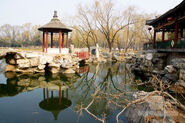Peking, or Beijing, is the current capital of China. The location's name is actually a fairly large debate; it was known as many names in China but primarily as the word "Beiping" (sometimes pronounced "Peiping"), meaning "northern peace." The name was soon changed to "Peijing," meaning "northern capital," which is where we now get the name "Beijing." The names "Peiping" and "Beijing" switched back and forth often because of disputes for the capital of China with Japan and with Taiwan. Now, though, Beijing is considered the well-known term for the capital.
Beijing is now one of the largest cities in China, second only to Shanghai, and is considered the cultural, governmental, and medicinal center of the country. Beijing is also the home of the Great Wall of China, the Summer Palace, Tiananmen Square, and many other important sites for Chinese history and culture.
Significance to Stevens[]
Stevens mentions Peking in line 41 of the section "Approaching Carolina" in "Comedian as the Letter C." He writes,
It seemed Elusive, faint, more mist than moon, perverse, Wrong as a divagation to Peking, To him that postulated as his theme The vulgar, as his theme and hymn and flight, A passionately niggling nightingale.
"Divagation" means a straying or wandering from, so "a divagation to Peking" seems to refer to someone (or, in this case, something) that meanders incredibly far--all the way to China! As part of the bigger picture, this line seems to discuss the fleeting nature of a poem to the poet/comedian.
However, it seems that Stevens himself would not have thought of a divagation to Peking so wrong; his letters show that he rather enjoyed souvenirs from Peking--especially jasmine tea (Lensing 238). In 1922, Ms. Lucy Monroe Calhoun, widow of William Calhoun, the Chinese-US ambassador, sent Stevens five packages with gifts, including a wooden figurine of a man with a lotus blossom (whom Stevens called "the prophet"), "a small jade screen," a jade figurine, and two small black crystal lion figurines. "We haved placed the screen behind the prophet, so that if he desires to retire into its cloudy color he can do so conveniently and we have set the lions in his path, one on each side. ... The other figure precedes the group as handmaiden and attendant casting most superior glances at the lions meaning, no doubt, to suggest that it would be best for them to put their tails between their legs and go about their business. Can you, in plain Sandburg, beat it?" (231-2) After hearing that Ms. Calhoun read some of his poems to her students in Peking and after receiving some of this tea from her, Stevens mentions that he would love to visit China, if he could only get out of Hartford (Letters 252).
In describing his gifts to Harriet Monroe, though, Stevens wonders how cultured or valuable China really is. "Is it the case, as it seems to be, that there is no vanity in China? There is, of course, since China has its own classics" (232). Perhaps Stevens viewed Peking and China as a whole to be an exotic yet primitive thing--much as, perhaps, he thought the "thin men of Haddam" viewed "golden birds" ("Thirteen Ways of Looking at a Blackbird," section VII).
Sources and Further Reading[]
Wallace Stevens: A Poet's Growth, by George S. Lensing, on Google Books




